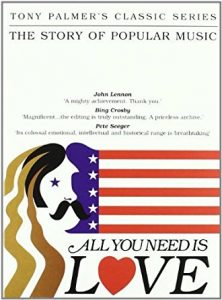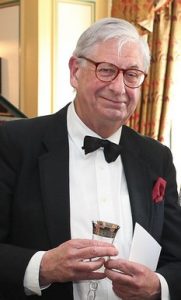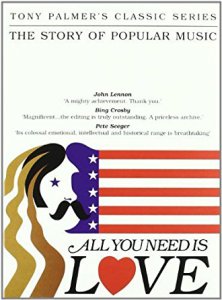|
August 7, 2008
Historical UK music documentary series receives long-awaited DVD release
GRAMMY.com
Nick Krewen

Thirty-two years after its world broadcast debut, the highly acclaimed British music documentary TV series “All You Need Is Love” has finally arrived at retail on DVD. Directed by renowned 200 Motels filmmaker Tony Palmer, the ambitious 17-episode, five-disc set traces the history of popular music from its African and European roots through blues, country, jazz, vaudeville, Tin Pan Alley, Elvis, rock, and the pre-punk instrumental opuses of Mr. Tubular Bells himself, Mike Oldfield.
Packed with candid interviews, intimate performances and rare film clips, Palmer traveled around the world in the mid-1970s in an attempt to capture the essence of the then-contemporary music scene: its genres, makers and motives.
Along the way, he sourced out several artists, songwriters, producers, record executives and personalities willing to hold court on the topic.
 Tony Palmer As a result, All You Need Is Love offers nearly 15 hours of priceless interviews and footage with some of music’s greatest legends, many of whom have since passed away: ragtime luminary Eubie Blake; composer Richard Rodgers; Sun Records’ Sam Phillips; industry executive/producer John Hammond; and John Lennon — who initially suggested the series’ filming to Palmer — to name a few.
The project’s historical importance certainly wasn’t lost on Palmer, a former pop music critic for London’s The Observer.
“I’m talking to 96-year-old Eubie Blake, who knew Scott Joplin,” recalls Palmer during a recent promotional trip. “If he’s 96, there’s a reasonable chance he’s not going to live another 20 years. I became aware that I was seizing a moment of history. It heightened my sense of responsibility.”
The set contains several memorable scenes of personal candor. For example, Palmer catches Jerry Lee Lewis in a vulnerable moment as the Killer reminisces about his scandalous marriage to his 13-year-old cousin Myra Brown and the devastating impact it had on his career. “Going from $10,000 a night to $250 a night was a pretty big disappointment,” Lewis told Palmer while he nonchalantly plucked away on a fiddle. “But I was man enough to fight my way back. Now it seems like there’s nothing to it, but it took 12 years of my life to fight my way back. Just for the love of a girl…and then she walked off. So I wonder, was it all really worth it? But that’s life — we must accept it as it is.”
In another captivating scene, eccentric producer, pop innovator and murder suspect Phil Spector sits within a shadowy room of his fortified L.A.-area mansion and tells Palmer his father committed suicide in front of him.
“I was astonished when he said it, but I didn’t provoke him into it because I didn’t know,” Palmer reflects. “But when you’re chatting, people start to say things. You’ve got to leave the tape on until they start to tell you something. They’re not going to tell you within the first 20 seconds. And if they are, you know somebody’s rehearsed them.”
As Palmer explains, he received unfettered access because his subjects were rarely accorded the opportunity to speak about their main passion: their craft.
“I think we got to all the people we did because it became very clear that we were taking them very seriously and treating them as both musicians and human beings with the respect that they absolutely deserved,” says Palmer. “On the whole, none of them had been treated like that.
“Plus, I never asked them about their sex life, their drugs, the length of their hair, or any of those things. I wasn’t interested in that. To me, that seemed insulting.”
Palmer says the other factor working in his favor was a willingness to meet the interviewees on their own turf.
“We decided the only way we could get these people was to go to them,” says Palmer, who used 476 songs in the series. “The fact that these guys from England did turn up in the middle of God knows where to film them I think quite impressed them.”
All You Need Is Love is also the place you’ll find exclusive Beatles‘ footage that even escaped the grasp of the Fab Four‘s meticulous 1996 Anthology series.
“I didn’t realize we had something exclusive until I went to a Beatlefest and somebody came up to me and said, ‘You do realize that Episode 14 was the first film that the Beatles had ever allowed to be made about themselves? You have footage that isn’t on Anthology.’ That simply never occurred to me.”
Palmer had forged a relationship with the Beatles through his 1968 pop/political documentary All My Loving. When he needed archived film of the Beatles, he was given carte blanche access.
“[Beatles personal assistant] Neil Aspinall, who died recently, said, ‘This is what the lads want. Take what you want,'” Palmer recalls.
Although the series hasn’t been broadcast since the early ’80s, Palmer says he was constantly peppered with public inquiries through the Internet regarding its availability.
However, a co-ownership squabble between UK financiers EMI and PolyGram prevented its release until, amid a number of takeovers and record company mergers, Palmer’s Isolde Films swooped in and grabbed the distribution rights. It was finally released in the United States in May.
Although he’s relatively satisfied with his attempt “to place the music in a kind of social, historical, political context worthy of serious study,” Palmer is unhappy about one aspect of the All You Need Is Love DVD set: its lack of bonus footage.
“Everything got destroyed by EMI,” laments Palmer, who said he shot hours of footage for each interview subject that was never used.
“I know the guy who signed the papers, and were it not for the fact that I have three small children, I don’t really want to spend 10 years in prison for justifiable homicide.”
(Nick Krewen is a Toronto-based journalist who has written for The Toronto Star, TV Guide, Billboard, Country Music and was a consultant for the National Film Board’s music industry documentary Dream Machine.)
|




Be the first to comment on "All You Need Is Love Rings True"